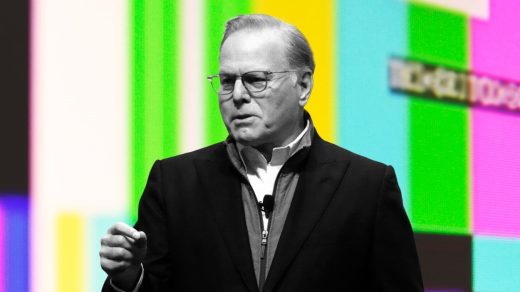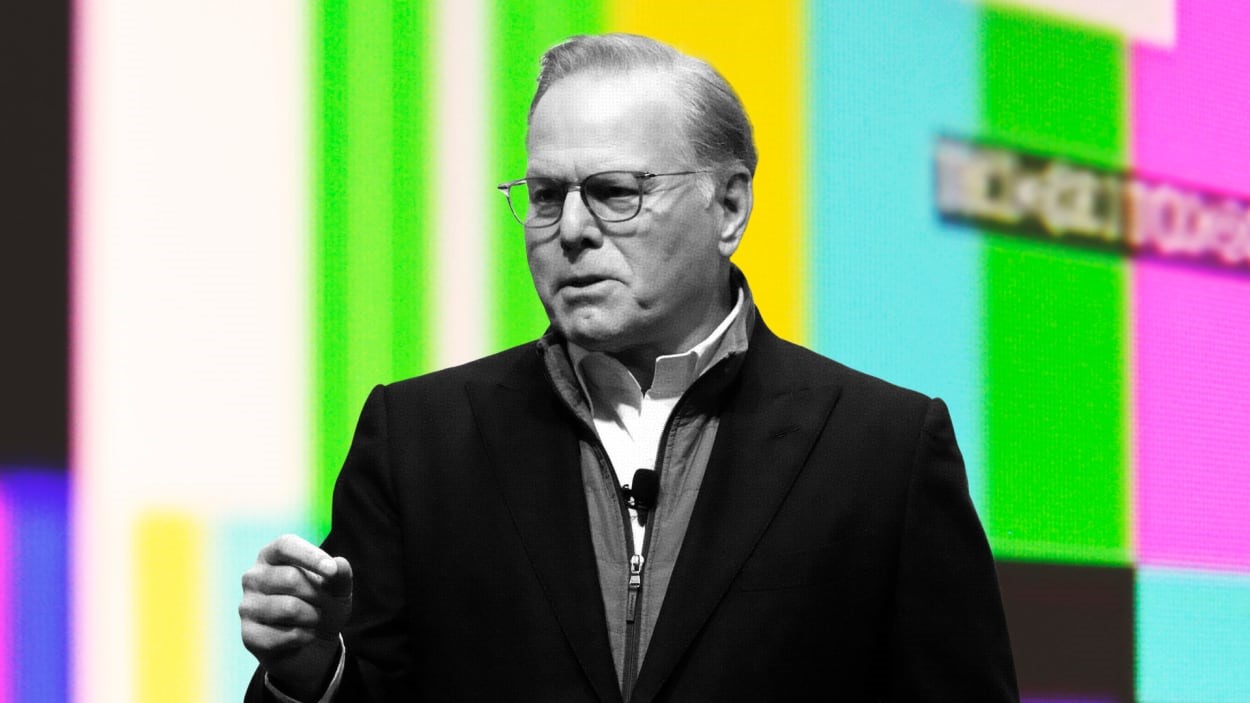Does the success of ‘Naked Attraction’ vindicate David Zaslav’s strategy for Max?
If you scan the list of top 10 shows on Max, the Warner Bros. Discovery streaming service, chances are you’ve come across—and maybe binge-watched—the British dating show Naked Attraction. (No judgment.) “The show is performing with outstanding demand,” Brandon Katz, an entertainment industry strategist at Parrot Analytics, told Fast Company. “It’s in the top 2.7% of shows in the U.S. in that time frame, which is obviously very good. I think it’s actually a really good microcosm as to why Warner Bros. Discovery combined Discovery+ and Max.”
A dating show featuring full-frontal nudity, Naked Attraction originally premiered in 2016 on the U.K.’s Channel 4. Those same episodes from seven years ago debuted on Max earlier this month. The premise is as follows: A clothed contestant is presented with six naked contestants and has to choose which one of them to go on a date with through rounds of elimination. The potential dates are slowly revealed starting from the bottom up, and it’s not until closer to the end of the segment that their faces are shown.
The goofy, horny dating show is certainly a departure from the type of Emmy Award-winning series viewers were used to watching on HBO prior to its merging with Discovery+. The premise might be shocking to some, but its success shouldn’t come entirely as a surprise.
Nearly five months after HBO Max and Discovery+—which was already home to several hit reality shows—merged to become Max, Naked Attraction’s success reflects the industry’s new realities. Between the ongoing SAG-Aftra strike and pressure from Wall Street to cut costs, executives such as Warner Bros. Discovery CEO David Zaslav are looking for new, low-cost ways to satisfy audiences. In practice, the big streamers are less willing to pledge huge budgets for a splashy series like Wheel of Time or Stranger Things. And so naked people from Britain are here to fill the void.
David Zaslav and lowbrow hits
“The Naked Attraction explosion is very much in line with what David Zaslav has outlined as the overarching strategy for Max, which is a combination of HBO, premium scripted TV shows and movies, and more lowbrow, broad-appeal, unscripted series,” Katz added.
The strategy drew intense backlash when it was first revealed late last year. Critics argued that HBO’s brand was built on prestige TV series like Succession, Game of Thrones, and The Sopranos, and that comingling these series with sophomoric reality shows would diminish its reputation for quality.
Moreover, HBO Max was already starting to draw criticism for canceling and removing a number of titles from the platform, including diverse and Latino-led shows and films like Gordita Chronicles and Batgirl. In response, some Democratic politicians wrote a letter to the U.S. Department of Justice, calling out Warner Bros. Discovery—which had implemented steep layoffs since Discovery acquired WarnerMedia from AT&T—for “hollowing out an iconic American studio.”
Zaslav and his team seemed to be making the case that Max, in its latest iteration, could reach new audiences with a different style of addictive programming—and the early success of Naked Attraction may well support their side of the argument. (Warner Bros. Discovery did not immediately respond to Fast Company’s inquiry for comment.)
Which is not to say that everyone is a fan. Naked Attraction has been criticized as prurient and silly. The 7-year-old show has also been taken to task for its lack of body diversity. Executive producer Darrell Olsen recently addressed the controversy and attention.
“What’s happening in the States right now is [like how the U.K. reacted] seven or so years ago,” Olsen told The Hollywood Reporter. “You have, ‘I can’t believe this is on-screen’—shock and outrage—mixed with, ‘This is quite amazing.’ The show isn’t for everyone, but everyone is interested in it. I think what will happen with you guys is, hopefully, what happened over here, where the ‘Oh my God, I can’t believe this is on TV’ turns into ‘It’s a pretty good show.’ Also, the stories get better and we push more boundaries [in the latter seasons].”
Sure, some might find the show to be outrageous. But unpixelated, full-frontal nudity aside, it’s not all that far off from the reality dating shows that have cropped up in the past few years on other networks and streaming services. Prior to the merger, Discovery+ featured reality series like TLC’s 90 Day Fiancé and the Discovery Channel’s similarly naked-heavy Naked & Afraid of Love, which features two strangers who survive and find love in the middle of nowhere without clothes.
Netflix’s Love Is Blind is one of the streaming service’s most popular reality dating shows ever. Since then, it has released equally successful original unscripted dating shows like Too Hot to Handle, where a group of singles stranded in paradise have to remain celibate to win a cash prize, and The Ultimatum, a show about commitment-phobic couples.
Last year, Peacock picked up Love Island, based on the U.K. reality dating series of the same name, for a fourth season after the first three seasons aired on CBS. It became Peacock’s most streamed original unscripted series, as well as the third-largest launch overall. Much of the love for reality dating shows can most likely be traced to the popularity of ABC’s long-running series The Bachelor and its many spin-offs, like The Bachelorette and The Golden Bachelor.
Parrot Analytics research found that unscripted content is on the rise as the global share of supply for reality, documentary, and variety have all increased from 2018 to 2022. In 2022, unscripted content made up 27% of all new TV debuts. According to a recent Statista survey, nearly a third of 18- to 29-year-olds watch reality TV shows, and HBO Max had previously experimented with developing its own original reality shows, but none of them seemed to connect with audiences.
The short-lived FBoy Island, in which women have to determine whether suitors are “nice guys” or self-proclaimed “fboys,” was canceled after two seasons—only to be picked up by the CW for a third season not long after. However, leaning on Discovery+’s pipeline and licensing the already-popular Naked Attraction might just be Max’s big break in the unscripted category. It was also a safe move for the company to fall back on developing and licensing unscripted series during the Hollywood writers’ and actors’ strike.
“HBO is not TV. HBO is HBO”
The changes at Max also suggest that the new regime at Warner Bros. Discovery believed that HBO Max was as a brand too much associated with the concept of Sunday night appointment viewing prestige TV, and that as a modern, diversified media property, it needed to bring in more viewers not just once a week but for hours on end every day.
During a Max promotional event in May, JB Perette, the company’s head of games and streaming, emphasized the removal of “HBO” from Max, saying “HBO is not TV. HBO is HBO. It needs to stay that way.” At the same time, Perette noted that his task was to “elevate and showcase our unparalleled array of other content and brands that will be key to broadening the appeal to this enhanced product.”
Until Naked Attraction came along, there wasn’t much evidence to back up the Max strategy and rebranding. In its latest quarterly earnings, Warner Bros. Discovery reported that Max lost 1.8 million subscribers, and it remains to be seen whether the current mix will entice more viewers to stick around. One thing that seems likely is that streamers across Hollywood will be shopping their libraries more than ever. At the same time that Naked Attraction is racking up viewers on Max, another series from the previous decade, Suits, is enjoying a similar renaissance on Netflix.
But for all of these companies, the question remains, Is this strategy built for the long term? Unscripted series and reruns may be a low-cost, high-ROI way of keeping viewers occupied today. But as any of the lovelorn singles on Naked Attraction can tell you, a relationship—whether with a subscriber or a much-tattooed call-center operator from Manchester—can be hard to sustain if, once you put your clothes back on, you don’t have much else to offer.
(19)



